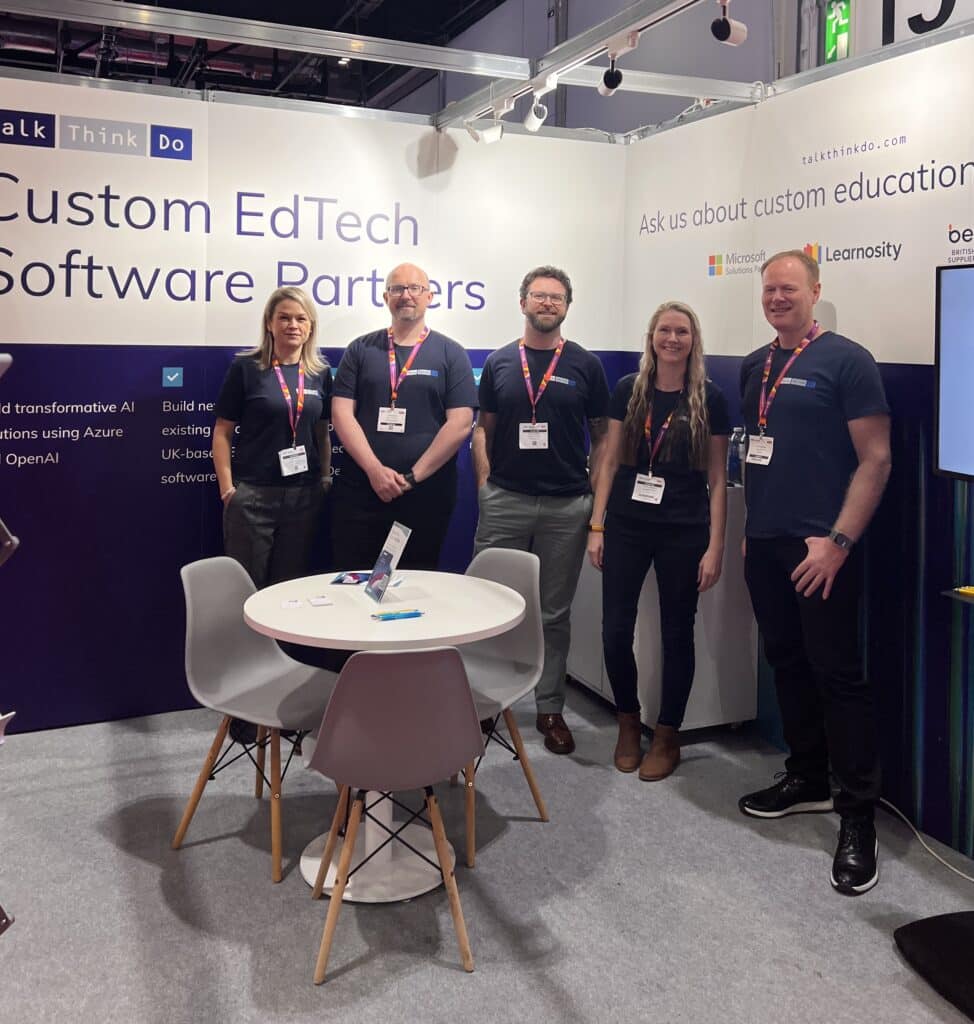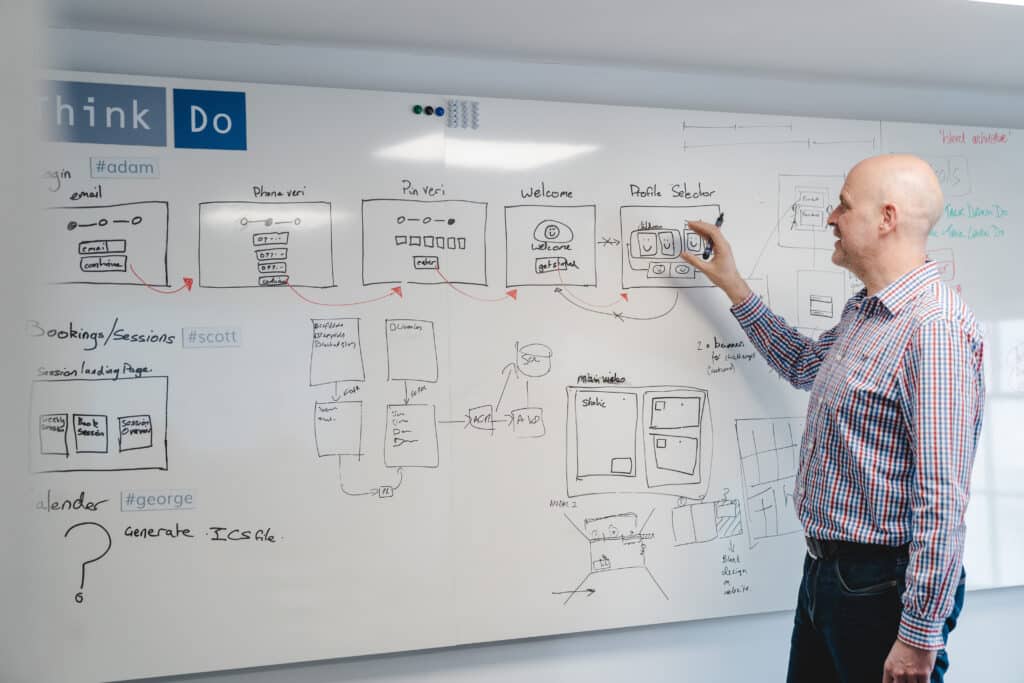EdTech is Changing: Are You Ready? Key Takeaways from Bett UK 2024

Bett UK 2024 brought together key innovators from across the EdTech industry, with over 300 speakers and 500 exhibiting companies in attendance. And we at Talk Think Do were proud to be among them.
The event gave me a lot of insight into just how much the EdTech landscape has changed over the last two years, with generative AI and machine learning continuing to develop in complexity and intelligence.
As the Secretary of State for Education Gillian Keegan acknowledged, 42% of primary and secondary school teachers have used generative AI in their role — a sharp increase from 17% the previous year.
The way we teach and learn is changing. What can technological innovators, educators, and learners do differently to improve educational outcomes?
In this article, I’ll be summarising my major takeaways from this year’s Bett UK show and answering some of the most critical questions in the EdTech space.
Bett UK 2024: in summary
Bett UK is an annual EdTech event that has been running for 39 years, making it one of the oldest technology shows in the country. Bett also runs Bett Asia and Bett Brazil, sharing innovation and technological exploration across the globe.
At Bett UK 2024, the Talk Think Do team and I particularly enjoyed hearing from Alex Russell OBE (CEO of the Bourne Education Trust) who discussed how AI can adapt to individual textual or visual learning styles to ensure better educational outcomes.
The event had a strong overall focus on the importance of AI-driven education, in which data is used to improve learning outcomes by creating more personalised, inclusive, and diverse educational experiences.
However, it was also widely acknowledged that using AI in this way requires a shift in the way organisations manage data, ensuring information is stored to be both accessible and secure.
AI-powered EdTech is the way forward
AI isn’t just going to dominate EdTech in 2024 — it’s going to continue informing EdTech solutions far into the future.
The novelty of publicly available GenAI models like ChatGPT has begun to wear off, creating space for increasingly sophisticated, personalised, and EdTech-specific applications.
As Rose Luckin, Professor at University College London, acknowledges,
“There’s been a lot of panic and anxiety, but also some excitement, and the realisation this [AI] isn’t going to go away. It will fundamentally change education.”
Gillian Keegan also recognised the potential concerns of teachers and educators in her opening statement:
“I also want to reassure those of you who think that AI, or any other technology, is somehow going to replace our brilliant teachers. It is not. No technology can replace them. It’s about giving them the confidence they need to succeed.”
One thing is clear: AI EdTech is the most effective way to augment human-led processes, offering both the efficiency of technological automation and highly personalised learning experiences.
Considering using AI in your organisation? Read our free eBook, created in collaboration with Learnosity, for expert insights on the top AI use cases for education publishers.

Key questions, answered
It was wonderful to meet and talk to a range of teachers, organisation leaders, and technology providers. As well as hear some of their burning questions on AI in EdTech.
To help you develop and establish your own EdTech strategy, I’ve consolidated answers to the top questions the team and I received at the event:
1. What are the tangible benefits of adopting AI for teachers, students, and educational institutions?
The benefits of AI will vary depending on the type of tool you employ, where you employ it, and how you manage it over time. The broad benefits of using AI in EdTech include:
- Students receive adaptive assessments and tailored feedback: Using AI to track learning data, tailor question delivery, or even author assessments can all be effective ways to boost overall student learning outcomes. AI also enables organisations to improve accessibility for diverse learners by delivering content in a way suited to their learning style.
- Teachers plan lessons and assessments more efficiently: Lesson planning and marking are two of the biggest time drains for teachers. AI can automate slow backend processes and provide teachers with summarised, highly accurate learning data, giving them more time to focus on individual student performance.
- Organisations reduce overhead costs: While AI is no replacement for teachers, it can help educational institutions reduce costs by minimising the need for individual subject specialists.
- Organisations can move away from outdated teaching practices: Education has been one of the last sectors to catch up to the digital age, and many institutions are still in the process of digitising their paper-based assessments. AI is helping to facilitate a shift towards more accessible, inclusive, and adaptive learning.

2. How can AI be applied in an educational setting?
AI, and particularly generative AI, has hundreds of potential applications within educational settings. Depending on what you are looking to achieve, you can either choose an off-the-shelf AI tool or develop a custom solution that is unique to the needs of your organisation.
Some popular applications of AI in education include:
- Deep search: If your data is stored and organised in a way that can be processed by AI, you can apply an intelligent search function to find specific information within large datasets.
- Content creation: AI can support human operators in writing assessments or generating informative content for students’ use.
- Adaptive assessments: Provide students with assessments tailored to their specific abilities, for improved performance and progress.
Read the Explore Learning case study, ‘Developing a Custom Assessment Engine and Platform for Optimised Learning Outcomes’, to discover how adaptive assessments can transform student experiences.
3. How should I go about implementing AI in my organisation?
Talk Think Do runs exploration workshops to help educational institutions and software partners identify how AI can best serve them. This includes:
- Identifying the core challenges your organisation is facing
- Considering your unique compliance requirements and data restrictions
- Understanding how your organisation can implement AI safely, without putting private data at risk
- Taking into account your budget, long-term goals, and internal capabilities.
Book a consultation to learn more about how AI could optimise your internal processes and boost student outcomes.

Step into the future of EdTech with Talk Think Do
Bett UK 2024 emphasised just how important it is for educational institutions to keep up with the rapidly changing digital landscape.
However, it also demonstrated the many different ways in which AI can be applied; to succeed, organisations must find or build solutions that will serve their business in the long term.
Talk Think Do helps craft tailored and adaptive learning experiences through custom EdTech solutions. We are a certified Microsoft Solutions Partner, and have worked with a range of educational organisations, including Learnosity, Hodder Education, and Explore Learning.
Following a fantastic experience at Bett UK, Talk Think Do will also be attending Bett Asia later this year. If you are attending, please come talk to us about all things EdTech, AI, and adaptive learning.
If you’d like to learn more about our AI services, check out our Custom OpenAI Development page. If you’re ready to speak to a member of our team, book a free consultation today.
Get access to our monthly
roundup of news and insights
You can unsubscribe from these communications at any time. For more information on how to unsubscribe, our privacy practices, and how we are committed to protecting and respecting your privacy, please review our Privacy Policy.
See our Latest Insights
Shipping AI in the Real World: Lessons From Our Latest Cycle
AI moves pretty fast. If you don't stop and look around once in a while, you could miss it. Recognising this, we have been running a structured approach to AI adoption for production systems. A critical element is ensuring we keep up with the latest approaches while retaining safety, responsibility and avoiding inefficiencies cause by...
Working as One Team: How Our Business Analysts Bridge Vision and Delivery
When clients partner with us, they often expect engineers and designers. But one of the most powerful roles behind a successful digital product is often less visible: the Business Analyst (BA). At Talk Think Do, BAs aren’t just requirement-gatherers. We’re connectors, between vision and execution, users and features, partners and platforms. In the recent delivery…
Implementing RAG AI Search on On-Premise Files with our AI Search Accelerator
As demand for AI‑powered tools like Microsoft Copilot grows, many organisations are asking the same question: “How can we harness the power of generative AI without moving our sensitive data to the cloud?” In this guide, we’ll explain why Retrieval‑Augmented Generation (RAG) is so effective for on‑premise data and walk through a practical approach using…
Legacy systems are costing your business growth.
Get your free guide to adopting cloud software to drive business growth.




